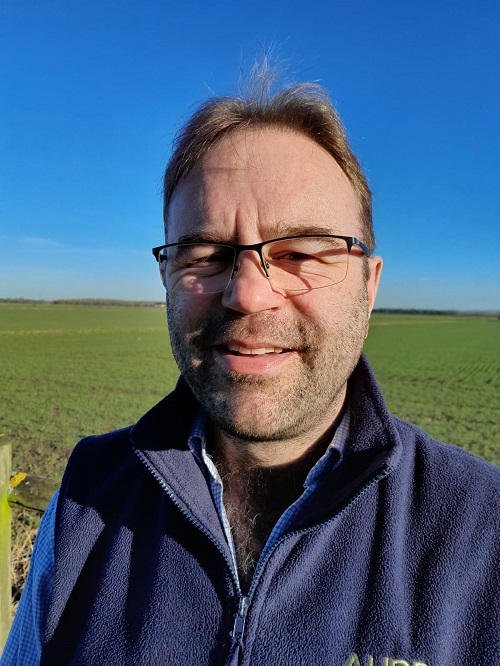Arable farmer reveals the softer side of Monitor Farms
Monday, 24 January 2022
As Colin Chappell hangs up his monitor farmer boots, AHDB's Judith Stafford asks him about his experiences and the tips he’d give to anyone thinking about taking on the mantle.
Farming is an emotive subject and draws strong opinions. And many farmers keep their cards close to their chests. Despite these daunting facts, monitor farmers sign up to open their doors, their accounts and their minds to others.
A local cohort of farmers can provide great support and at the same time strong criticism. Nowhere has that been truer than at Gander Farm near Brigg in Lincolnshire, where fourth-generation farmer Colin Chappell stuck his head above the parapet and became an AHDB Cereals & Oilseeds monitor farmer in 2017.
About Brigg Monitor Farm
Gander Farm is a traditional mixed Lincolnshire farm. Of the 645 hectares, only 40 hectares are permanent pasture. The lowland farm is controlled by the River Ancholme. Dominated by high clay content (62%) soil, the farm often experiences flooding and waterlogging, but not droughts.
The first meeting
At his first meeting, Colin spoke to a room full of stern faces and crossed arms. Nominated by somebody else to host the monitor farm, he must have wondered what he’d let himself in for. He shook like a leaf.
Being a monitor farmer isn’t about age, experience or farm size. It’s an attitude – a willingness to listen, to accept criticism and to learn. It can take a while to warm to the role. Before long, however, the group became tightly knit, explored many subjects, learnt hard lessons, and shared highs and lows. To sum up: they opened their hearts and their minds.
Sharing problems
Colin said: “Being a monitor farmer has transformed the way I farm and think. Farmers are not always the best at talking to each other – and, initially, I found this hard. When you open up and talk, however, you learn that we’re not too different and we face similar issues – such as the loss of funds through the Basic Payment Scheme (BPS). Now I say that speaking with farmers was the part I enjoyed most. We need to support each other and find solutions to the challenges we face.”
Colin’s most memorable meeting session covered the topic of stress: “Towards the end of my time as a monitor farmer, one of the most powerful things happened. I spoke about some specific issues I had with the Rural Payments Agency (RPA), as well as the general weight of bureaucracy on our shoulders. My story encouraged somebody else (now a very close friend) to tell his story – which was far more problematic than my own situation.
“Acknowledging struggles is the first step in finding a way out of them. Discovering others who face the same challenges is a comfort. Through sharing, relationships deepen, trust is built and support networks develop – it is very special to be part of this.”
Measuring performance
Over the past four years as a Monitor Farm, there has been a spotlight on the practical, technical and business aspects of Colin’s farm – with measurement, through benchmarking and monitoring, used extensively.
Colin said: “One year you can be at the top, the next at the bottom – the important thing to understand is why this happens. It will give you more confidence to make decisions.
“By happenstance, we hired a combine for one harvest. A close eye on my accounts made me question why I needed to own a combine, when it is only used six weeks each year. Why spend all our hard-earned profit? To stop the government getting its hands on some of it through tax?”
Technical challenges
During the Monitor Farm period, the farm has transitioned from ploughing to direct drilling, which was a challenge on the clay soils. As part of these system changes, Colin has also used more spring crops and cover crops.
Colin said: “I think of our soil as a living, breathing organism, treating it with kid gloves. The less I do to the soil, the healthier it is.”
His approach has delivered improvements in soil structure, widening work windows, and reduced the black-grass seed burden. He also spends less on fuel (per hectare) and fertiliser.
Asked what advice he’d give to somebody thinking about becoming a monitor farmer, Colin said: “Don’t hesitate. Go for it. It is a challenge, but it only challenges what’s happening inside your head. It will transform you and the way you farm.”
 AHDB
AHDB
Monitor Farm podcast
Hear from three Monitor Farmers – Richard Orr (Downpatrick), Roger Wilson (Malmesbury) and Colin Chappell (Brigg) – as they discuss their respective journeys and share their views on the future of AHDB.

